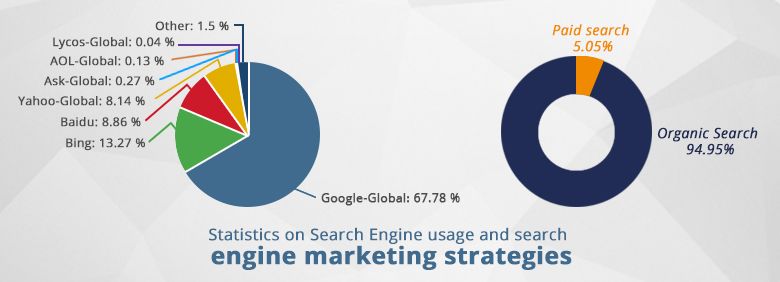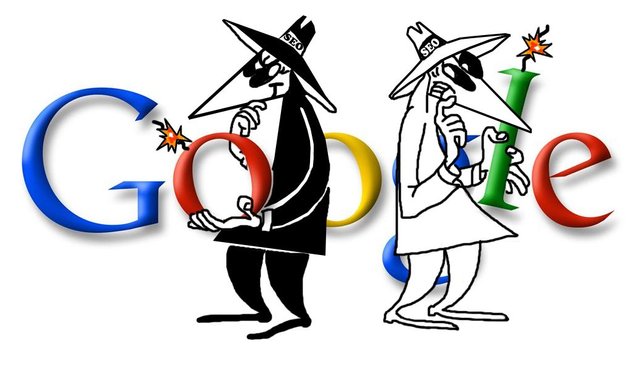[Guide] Basic Introduction To SEO - Improve Your Rankings
This is a very basic guide to search engine optimisation (SEO) for yourself or for your business, there is so much information out there about SEO it is hard to find the right resources to begin your journey. This guide will help you in your steps to learning about search marketing.
What Is SEO And Why Do I Need It?
Search engine optimisation is the process of ranking your website in the organic listings of search engines such a Bing, Yahoo and Google. Search engine optimisation is not a once off task; it is an on-going investment in continuously improving and adapting your strategies. Search engines want the most relevant and informative websites to show for peoples search so our aim is to be the most relevant and informative.
There are over 6,586,013,574 searches per day all over the world (Smart Insights, 2017). Need I say more? If you are not focusing on getting onto the front page you are doing yourself a huge disservice.
Breaking Down The Engine - On-Page
In simple terms search engine optimisation can be broken down into two parts; On-page and off-page optimisation. On-page optimisation is the method of optimising your website pages to rank higher in the search engine results page.
The first step of on-page is finding the right keywords for your niche; if you are selling flowers in New York, for example, your keyword might be "best florist in New York". Keywords are the foundation of every SEO campaign, conducting proper research and selecting the right keywords is essential. I personally like to use https://www.semrush.com/ for my research but there are many other tools out there.
Content is king in the eyes of search engines, your content needs to answer a question or be relevant to the people searching. If you struggle to write good content you can get professionally written articles for you, there are many great freelancers out there that focus on SEO content. Unfortunately, there is so much to talk about content I could write an entire post about it, just remember; you can never go wrong with high-quality content.
The next step in on-page is ensuring you have correct and optimised title tags, title tags are what show up the search engines result page and let search engines know what your page is about. A good title can determine whether someone clicks on your site or not. The recommended length of your title tag is between 50-70 characters, this is because search engines often do not display more than that. The recommended format for title tags is
Main Keyword - Alternate Keyword | Company/Product name .
The penultimate step to on-page is your URL's. URL's give a hierarchy and build relevancy to your selected page. Optimised URL's also look better to your average visitor and let them know what the page is about. Let me demonstrate with some examples:
• An example of a good URL is http://www.glb-scaffolding.co.za/hire/johannesburg/
You immediately know the website is about scaffolding and they are hiring out scaffolding in Johannesburg.
• An example of a bad URL is http://www.imdb.com/title/tt3544734/?ref_=nm_knf_i2
From that URL it is impossible to tell what the page is about and thus bad for search engines and visitors.
Our final on-page optimisation step is to ensure all images on your page are optimised for speed and to add alt-text to your images. Making your page faster for potential visitors can increase your conversion rates if all else is equal; having a faster page will put your website above your competitors in the search engine results page (SERPs). Adding alt-text to your images is essential to building relevancy and letting search engines know your topic. Notice how with all these methods it is about building relevancy and establishing your topic. Your alt-text should preferably be the subject of your page or a related keyword.
Off-Page Optimisation
Let us first begin with; what is off-page optimisation? Off-page is the practice of acquiring link's from high authority websites across the web, each link to your website is counted as a sort of vote from that website, the same way you would up vote a Steemit post and it gets more recognition. It is the same thing for SEO, the more votes you acquire the more relevant you are. Off-page is not just about link building but social media marketing as well as social bookmarking.
Link building methods range from blogger outreach to forum signatures. There is a multitude of different methods to acquire links. The most important thing to do though is try to obtain links from relevant sites, for example, if you are in the golf niche you would want links from relevant sports blogs and website. One relevant link is more powerful than 100 random links.
Managing your social media profiles are becoming more and more critical to ranking in the SERPs, social signals such as likes and follows tell search engines that people like your content and want to see more of it. Social media profiles are given a "no follow" link which means that you will not get any "juice" to your website through social media. Before I go further let me explain follow and no follow links. A follow link is a link that passes authority onto your website and a no follow link does not pass any authority and just gives you the traffic from the link. You want to build a diverse portfolio of follow and no follow links, my personal recommendation is 70% no follow and 30% follow. Regardless of the no follow tag social media profiles are a must have.
Whitehat? Blackhat? Greyhat?
If you are unfamiliar with these terms let me explain:
• Whitehat - Whitehat SEO is the act of doing everything by the book, you do not break any search engines rules and build your website and links naturally.
• Blackhat - Blackhat is the practice of using forbidden methods to build links and outrank your competition, getting caught using blackhat will get you penalised by search engines.
• Greyhat - Greyhat is somewhere in the middle of the two, you are not completely innocent but you also aren't using completely blackhat tactics.
Most of us will fall in-between the two, never being completely white hat as it is a lot harder to achieve rankings but also never completely blackhat. My personal recommendation is to learn whitehat SEO as it will teach you the basics and get you started. The world of blackhat can be very rewarding but at the same time it could all be taken from you in an instant.
There is honestly so much to teach about SEO and we haven't even scratched the surface. I hope this rough breakdown has helped teach you a thing or two about search engine optimisation. If there are enough people that enjoy this I will definitely create more guides and content on internet marketing.
Thanks for reading and don't stop learning!





Good job. That was a very simple intro to SEO. I work for an SEO agency in the US, and SEO is only going to become more important as a greater amount of business's customers will be coming through the interwebs.
I am new to steemit, but I will be posting on SEO and content writing @ironmanmatt
Thanks Matt. I just wanted to give a simple intro for people who are new to the game. I look forward to seeing your posts. Followed :)
Great post , thanks for sharing.
Upvoted.
Cheers :)
Thanks so much man. Have a great day will see you around.
you very welcome dude. have a great day too. :)
Really nice post !
Thanks! :)
amazing very informative
Thanks mate :)
i start follow you from now :)
Thanks for the info - great post (for us who know nothing... John Snow!)